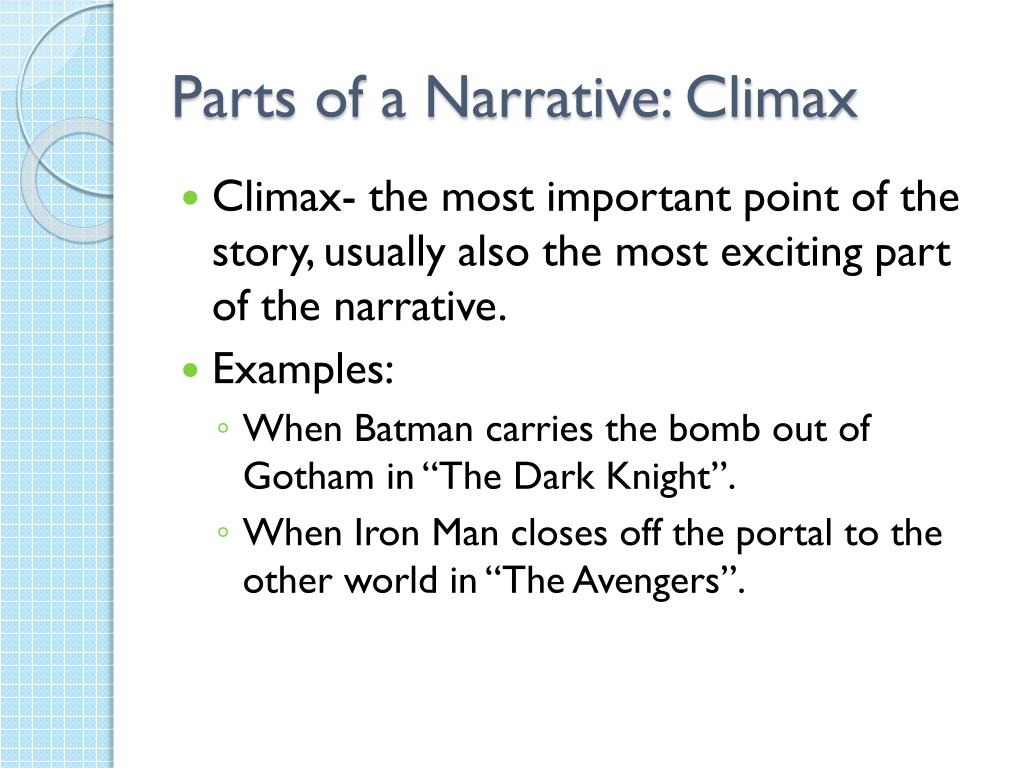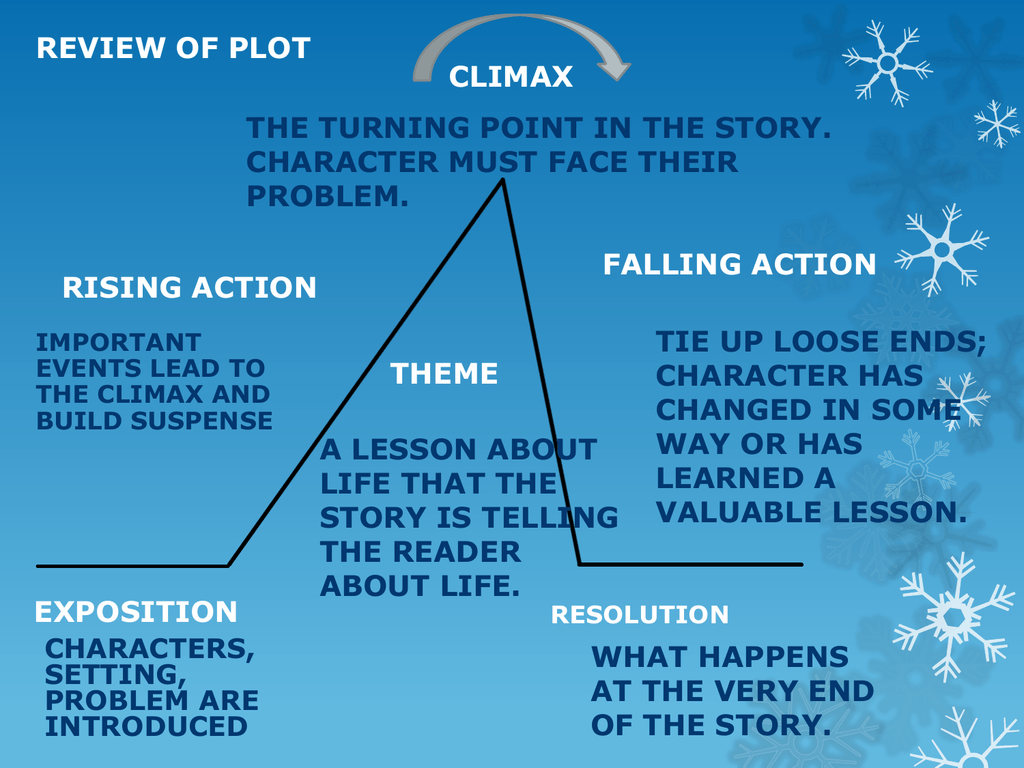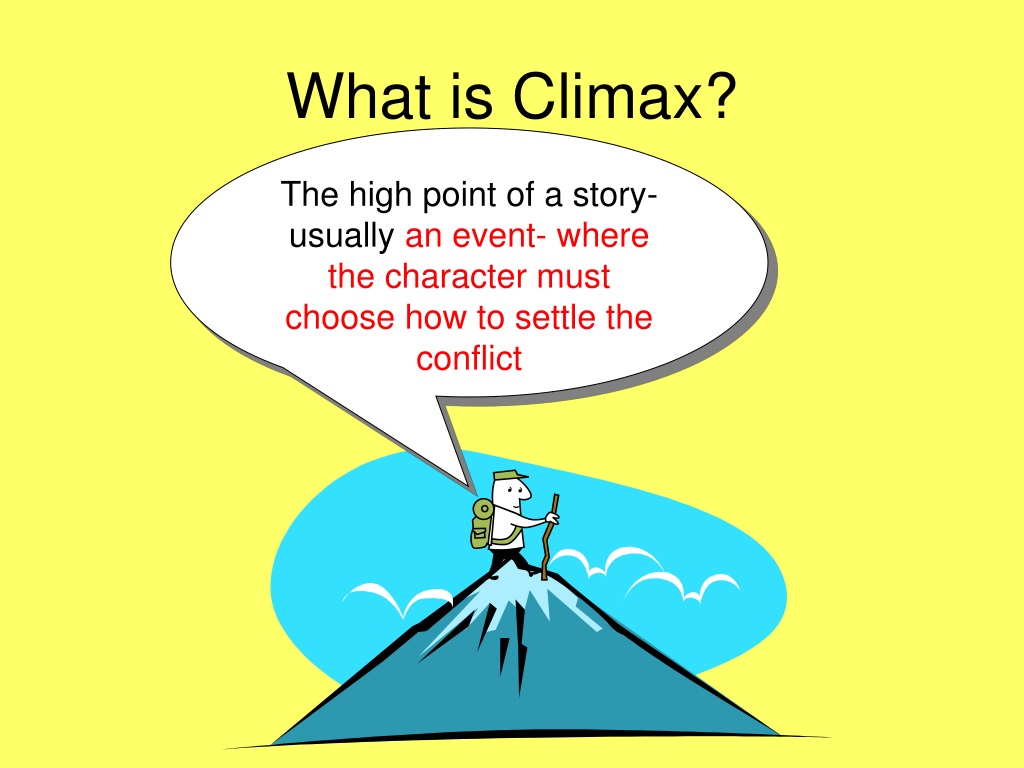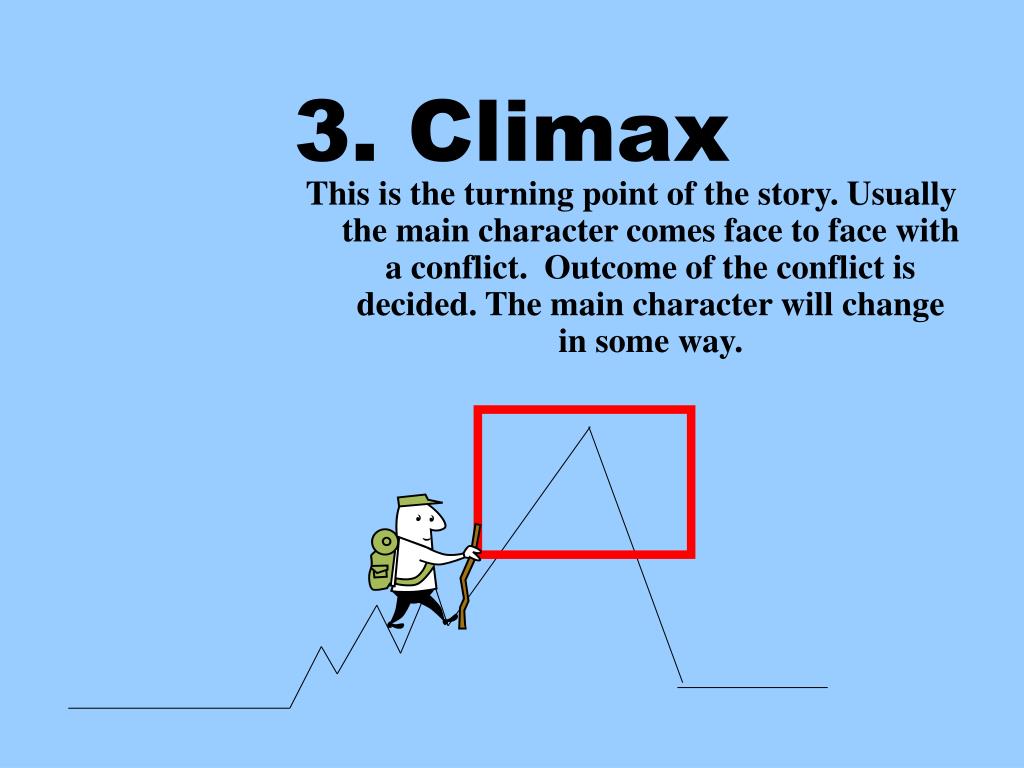Climax In A Narrative
Climax In A Narrative - Here’s a quick and simple definition: The phrase climax is derived from the greek word klimax. The climax of a story is the most exciting part, what readers are waiting for. Often, climax is also when the main problem of the story is faced and solved by the main character or protagonist. The climax, the turning point where the bubbling tension pops and the characters have to take crucial action, turns a narrative into a satisfying story, whether you’re reading it, watching it on a screen or stage, or listening to. The climax of a plot is the story's central turning point—the moment of peak tension or conflict—which all the preceding plot developments have been leading up to. Here's how to craft the perfect climax in writing your story. Climax is the highest point of tension or drama in a narratives ’ plot. The climax (from ancient greek κλῖμαξ (klîmax) 'staircase, ladder') or turning point of a narrative work is its point of highest tension and drama, or it is the time when the action starts during which the solution is given. What is the climax of a plot?
What is the climax of a plot? The climax (from ancient greek κλῖμαξ (klîmax) 'staircase, ladder') or turning point of a narrative work is its point of highest tension and drama, or it is the time when the action starts during which the solution is given. The phrase climax is derived from the greek word klimax. The climax of a story is the most exciting part, what readers are waiting for. Here’s a quick and simple definition: The climax, the turning point where the bubbling tension pops and the characters have to take crucial action, turns a narrative into a satisfying story, whether you’re reading it, watching it on a screen or stage, or listening to. The climax of a plot is the story's central turning point—the moment of peak tension or conflict—which all the preceding plot developments have been leading up to. Climax is the highest point of tension or drama in a narratives ’ plot. Often, climax is also when the main problem of the story is faced and solved by the main character or protagonist. Here's how to craft the perfect climax in writing your story.
Climax is the highest point of tension or drama in a narratives ’ plot. The climax of a plot is the story's central turning point—the moment of peak tension or conflict—which all the preceding plot developments have been leading up to. What is the climax of a plot? Often, climax is also when the main problem of the story is faced and solved by the main character or protagonist. Here’s a quick and simple definition: The phrase climax is derived from the greek word klimax. Here's how to craft the perfect climax in writing your story. The climax of a story is the most exciting part, what readers are waiting for. The climax (from ancient greek κλῖμαξ (klîmax) 'staircase, ladder') or turning point of a narrative work is its point of highest tension and drama, or it is the time when the action starts during which the solution is given. The climax, the turning point where the bubbling tension pops and the characters have to take crucial action, turns a narrative into a satisfying story, whether you’re reading it, watching it on a screen or stage, or listening to.
What is a Story Climax? & How to Write One! The Art of Narrative
The climax of a plot is the story's central turning point—the moment of peak tension or conflict—which all the preceding plot developments have been leading up to. Here's how to craft the perfect climax in writing your story. The climax, the turning point where the bubbling tension pops and the characters have to take crucial action, turns a narrative into.
PPT Parts of a Narrative PowerPoint Presentation, free download ID
The climax of a story is the most exciting part, what readers are waiting for. Often, climax is also when the main problem of the story is faced and solved by the main character or protagonist. Climax is the highest point of tension or drama in a narratives ’ plot. Here’s a quick and simple definition: What is the climax.
Plot Diagram
The climax, the turning point where the bubbling tension pops and the characters have to take crucial action, turns a narrative into a satisfying story, whether you’re reading it, watching it on a screen or stage, or listening to. Here's how to craft the perfect climax in writing your story. Climax is the highest point of tension or drama in.
Identifying the Climax of a Story YouTube
The climax of a story is the most exciting part, what readers are waiting for. Climax is the highest point of tension or drama in a narratives ’ plot. The phrase climax is derived from the greek word klimax. The climax of a plot is the story's central turning point—the moment of peak tension or conflict—which all the preceding plot.
Climax Of A Story Definition slideshare
Climax is the highest point of tension or drama in a narratives ’ plot. Here’s a quick and simple definition: The climax of a plot is the story's central turning point—the moment of peak tension or conflict—which all the preceding plot developments have been leading up to. Here's how to craft the perfect climax in writing your story. What is.
What is a Story Climax? & How to Write One! The Art of Narrative
What is the climax of a plot? The climax of a plot is the story's central turning point—the moment of peak tension or conflict—which all the preceding plot developments have been leading up to. The climax of a story is the most exciting part, what readers are waiting for. The climax, the turning point where the bubbling tension pops and.
PPT Elements of a Narrative Story PowerPoint Presentation, free
Often, climax is also when the main problem of the story is faced and solved by the main character or protagonist. The climax of a story is the most exciting part, what readers are waiting for. Climax is the highest point of tension or drama in a narratives ’ plot. The climax, the turning point where the bubbling tension pops.
What Is the Climax of a Story? The Definition and Examples StoryFlint
Climax is the highest point of tension or drama in a narratives ’ plot. The phrase climax is derived from the greek word klimax. The climax (from ancient greek κλῖμαξ (klîmax) 'staircase, ladder') or turning point of a narrative work is its point of highest tension and drama, or it is the time when the action starts during which the.
PPT Elements of a Story PowerPoint Presentation ID649157
What is the climax of a plot? The climax, the turning point where the bubbling tension pops and the characters have to take crucial action, turns a narrative into a satisfying story, whether you’re reading it, watching it on a screen or stage, or listening to. The phrase climax is derived from the greek word klimax. Here’s a quick and.
What Is the Climax of a Story? [Definition and Examples]
Often, climax is also when the main problem of the story is faced and solved by the main character or protagonist. The climax of a plot is the story's central turning point—the moment of peak tension or conflict—which all the preceding plot developments have been leading up to. Climax is the highest point of tension or drama in a narratives.
Here’s A Quick And Simple Definition:
Here's how to craft the perfect climax in writing your story. The climax of a story is the most exciting part, what readers are waiting for. The climax, the turning point where the bubbling tension pops and the characters have to take crucial action, turns a narrative into a satisfying story, whether you’re reading it, watching it on a screen or stage, or listening to. The phrase climax is derived from the greek word klimax.
Climax Is The Highest Point Of Tension Or Drama In A Narratives ’ Plot.
The climax (from ancient greek κλῖμαξ (klîmax) 'staircase, ladder') or turning point of a narrative work is its point of highest tension and drama, or it is the time when the action starts during which the solution is given. What is the climax of a plot? Often, climax is also when the main problem of the story is faced and solved by the main character or protagonist. The climax of a plot is the story's central turning point—the moment of peak tension or conflict—which all the preceding plot developments have been leading up to.








![What Is the Climax of a Story? [Definition and Examples]](https://neilchasefilm.com/wp-content/uploads/2022/07/How-do-I-Write-The-Climax-of-a-Story-1.png)